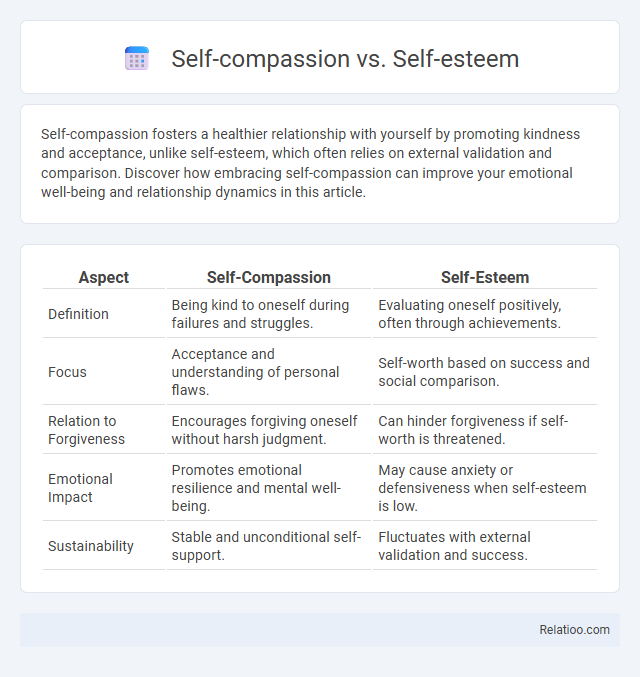Self-compassion fosters a healthier relationship with yourself by promoting kindness and acceptance, unlike self-esteem, which often relies on external validation and comparison. Discover how embracing self-compassion can improve your emotional well-being and relationship dynamics in this article.
Table of Comparison
| Aspect | Self-Compassion | Self-Esteem |
|---|---|---|
| Definition | Being kind to oneself during failures and struggles. | Evaluating oneself positively, often through achievements. |
| Focus | Acceptance and understanding of personal flaws. | Self-worth based on success and social comparison. |
| Relation to Forgiveness | Encourages forgiving oneself without harsh judgment. | Can hinder forgiveness if self-worth is threatened. |
| Emotional Impact | Promotes emotional resilience and mental well-being. | May cause anxiety or defensiveness when self-esteem is low. |
| Sustainability | Stable and unconditional self-support. | Fluctuates with external validation and success. |
Understanding Self-Compassion: A Definition
Understanding self-compassion involves recognizing it as an active process of treating oneself with kindness, especially during moments of failure or suffering, distinct from self-esteem which depends on evaluations of self-worth often tied to success. Unlike self-compassion, self-esteem varies with external achievements or social comparison, making it less stable and sometimes conditional. Emphasizing mindfulness and common humanity, self-compassion fosters emotional resilience and balanced self-awareness without reliance on positive self-evaluation.
Defining Self-Esteem: What It Really Means
Self-esteem represents your overall sense of personal value and self-worth, often tied to achievements, abilities, and external validation. Unlike self-compassion, which involves treating yourself with kindness during failures without judgment, self-esteem can fluctuate based on success and social comparisons. Understanding the true meaning of self-esteem helps differentiate it from self-compassion and fosters a balanced approach to personal growth and emotional well-being.
Core Differences Between Self-Compassion and Self-Esteem
Self-compassion involves treating oneself with kindness and understanding during times of failure or suffering, emphasizing acceptance rather than judgment. In contrast, self-esteem is based on evaluating one's worth by comparing oneself to others or achieving success, which can fluctuate depending on external validation. Core differences highlight that self-compassion fosters emotional resilience and unconditional self-acceptance while self-esteem often relies on performance and approval, making it more fragile and variable.
Psychological Benefits of Practicing Self-Compassion
Practicing self-compassion enhances emotional resilience by fostering a kind and understanding relationship with Yourself during moments of failure or suffering, reducing negative self-criticism often linked to low self-esteem. Unlike self-esteem, which depends on external validation and comparisons, self-compassion provides a stable, intrinsic source of psychological well-being that helps alleviate anxiety and depression. Research highlights that self-compassion promotes adaptive coping strategies and boosts motivation, leading to improved mental health and overall life satisfaction.
Risks and Limitations of Relying on Self-Esteem
Relying heavily on self-esteem can lead to risks such as vulnerability to external validation, increased sensitivity to criticism, and potential narcissism, which undermine your emotional resilience. Unlike self-compassion, which promotes kind acceptance and growth through challenges, self-esteem often fluctuates based on success or failure, making it less stable and potentially harmful. Understanding these limitations highlights why cultivating self-compassion is crucial for maintaining balanced mental health and authentic self-worth.
Self-Compassion and Emotional Resilience
Self-compassion involves treating oneself with kindness during times of failure, promoting emotional resilience by reducing negative self-judgment and fostering adaptive coping strategies. Unlike self-esteem, which often depends on external validation and social comparison, self-compassion cultivates a stable inner strength that supports mental well-being regardless of external circumstances. Research from Kristin Neff highlights that higher self-compassion correlates with lower anxiety, depression, and greater emotional resilience, making it a critical factor in psychological health and recovery.
How Self-Esteem Impacts Mental Health
Self-esteem plays a crucial role in mental health by influencing emotional resilience and overall psychological well-being. High self-esteem is associated with lower levels of anxiety, depression, and stress, while low self-esteem often correlates with increased vulnerability to mental health disorders. Unlike self-compassion, which emphasizes kindness towards oneself during failures, self-esteem centers on self-worth and can fluctuate based on external validation, affecting mental health stability.
Cultivating Self-Compassion: Practical Strategies
Cultivating self-compassion involves treating yourself with kindness during moments of failure or difficulty, promoting emotional resilience and reducing self-criticism. Unlike self-esteem, which relies on external achievements and comparisons, self-compassion offers a stable source of inner support regardless of circumstances. Practical strategies include mindfulness meditation, positive self-talk, and writing self-compassionate letters to nurture a healthier relationship with your inner self.
Balancing Self-Esteem and Self-Compassion for Personal Growth
Balancing self-esteem and self-compassion is essential for personal growth, as self-esteem often relies on external validation while self-compassion fosters internal acceptance and resilience. High self-esteem can promote confidence and achievement, but overreliance on it may lead to defensiveness or narcissism. Cultivating self-compassion encourages a balanced mindset by allowing individuals to embrace imperfections and setbacks with kindness, ultimately supporting sustainable growth and emotional well-being.
Self-Compassion vs Self-Esteem: Which Supports Long-Term Wellbeing?
Self-compassion promotes long-term wellbeing by encouraging kindness toward yourself during setbacks, fostering resilience without the need for external validation. Unlike self-esteem, which fluctuates based on achievements and social comparisons, self-compassion remains stable, reducing anxiety and enhancing emotional regulation. Your long-term mental health benefits more from cultivating self-compassion than relying solely on self-esteem for self-worth.

Infographic: Self-compassion vs Self-esteem
 relatioo.com
relatioo.com